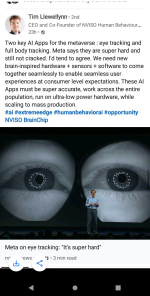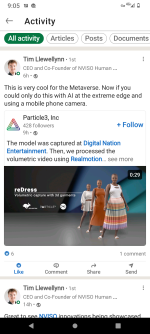Mandatory reading IMO. Article written by René Torres the VP / General Manager of IOT Sales and Marketing Group at Intel Corporation.
sponsored content
Enabling the era of intelligent edge
René Torres
In a few years, we may be largely living “on the edge.” As the amount of data grows exponentially, there is a greater need for edge computing solutions to aid in real-time decision-making. Gartner
predicts that by 2025, 75% of enterprise-generated data will be created and processed at the edge, outside of traditional centralized data centers or the cloud.
But with data centers and cloud computing traditionally supporting data flow, where does edge fit in? As a form of distributed computing, edge computing enables processing to happen where data is being generated. The convergence of 5G networks with edge computing means data is not only traveling faster, but can be quickly translated via media, inferencing and analytics into insights and action, enabling new, ultra-low latency applications to come to life. An autonomous vehicle that senses a pedestrian moving into the road may have less than a second to stop or swerve to avoid hitting them, and removing the latency caused by the data traveling to the cloud and back could literally be life-saving. Other benefits of analyzing data at the edge include stronger security protection of data, lower transportation costs, enhanced data quality and increased reliability, particularly in rural or remote places.
A fireside chat with Intel
youtu.be
The opportunities and challenges of edge adoption
The ability to make fully autonomous vehicles a reality is just one example. Together, 5G and the intelligent edge will enable a new era of distributed intelligence that will transform all types of industries, from smart cities to health care. According to
IDC, 77% of U.S. organizations regard edge as a strategic business investment. The need for edge solutions has also been accelerated by the pandemic due to trends like distributed workforces, the growth of remote environments and companies’ digital transformations.
At the same time, while realization of the value of the intelligent edge is growing, companies are struggling to find the right resources to move adoption forward. An
IDG survey found that top challenges include identifying clear use cases, security, a lack of internal skills and cost. If the age of distributed intelligence is to reach its full potential, solution providers will need to rely on proven hardware and software platforms, supported by trusted partners with industry-specific experience.
The intelligent edge, practically applied
On the factory floor, the convergence of technologies like edge, 5G, AI and automation is setting the stage for sectorwide Industry 4.0 transformation. Specifically, edge computing is enabling manufacturers access to real-time insights about operations, which allows them to automate control and monitoring processes, optimize logistics and anticipate and correct anomalies before they impact production. Modernizing the factory can be a complicated process due to the time and cost associated with replacing legacy systems with new technology and ensuring everything seamlessly integrates. However, edge computing with 5G can also provide greater flexibility to connect the factory in stages over time, since compute is localized. Intel is currently working with partners to build an end-to-end smart factory to demonstrate how with a modular application environment, digitalization can happen at any scale.
In health care, edge computing could have a similarly transformative effect on patient care. In the near-term future, edge devices may help with sharing real-time data about patients’ vital signs as soon as they enter an ambulance. Instead of having to run an assessment and additional tests once the patient arrives at the hospital, doctors and clinicians would be able to utilize the data already gathered to begin care immediately, continuing to assess, analyze and adjust treatment through the operative and the post-operative phases and beyond to ensure care is always personalized and based on the most up-to-date information. This is a single example; already, edge devices are being used in many other areas of health care to aid with advanced remote patient monitoring, image-based diagnostics, medical equipment management and robotic surgery.
What’s next for intelligent edge adoption
As companies’ edge innovations scale and mature, moving from POC to full-scale deployment, collaboration will play a large role in the success of projects. Solution providers are beginning to realize the value of partnering with technology providers with deep, purpose-built portfolios and industry experience to develop customized edge solutions that drive efficiencies and outcomes. Security will remain a key concern, with connected, intelligent devices making attractive targets for attackers interested in stealing data or disrupting the flow of operations. For that reason, providers should also seek platforms infused with silicon-level telemetry to improve the detection of advanced threats at every level.
Distributed computing will enable limitless potential by ensuring many everyday devices aren’t just connected, but intelligent. In this future, data will no longer be stored in centralized locations, but always moving to where it can provide the most value. The companies that master the manipulation of data this way will be the ones to unlock its true potential, unleashing a new wave of innovation.
René Torres
René Torres is currently the VP / General Manager of IOT Sales and Marketing Group at Intel Corporation. René has been with Intel for 20+ years having started in 1997. René has worked in multiple management roles including sales, marketing, product management, and platform application engineering for Intel Architecture and software solutions with a special focus on markets such as wireless communications infrastructure, networking and mobile client computing. Prior to his current role, René was the Director of Marketing & Platform Enabling for Software Defined Networking and Network Function Virtualization in the Data Center Group (DCG). René was also the chief of staff and technical assistant to Doug Davis, SVP and GM of the Internet of Things Group (IOTG). He has worked abroad under three expat assignments in Brazil, China and Germany. René has a BS in Business Administration from Pepperdine University and MBA in Global Management from the Thunderbird School of Global Management.



